|
|
|
Sort Order |
|
|
|
Items / Page
|
|
|
|
|
|
|
| Srl | Item |
| 1 |
ID:
108058
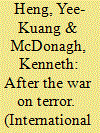

|
|
|
|
|
| Publication |
2011.
|
| Summary/Abstract |
In March 2009, the Obama administration sent a message to senior Pentagon staff instructing them to refrain from using either of the terms 'Long War' or 'Global War on Terror' and to replace these terms with 'Overseas Contingency Operations'. The change in tone and, potentially, substance, from the Obama White House by ending the 'war on terror' at the rhetorical level suggests a need to shift our academic attention towards developing more appropriate analytical frameworks for examining alternative strategies for countering terrorism. This paper seeks to explore what it terms an emerging risk-based approach being deployed by states. Our framework proposed here deploys the twin concepts of 'risk bureaucracies' and risk regulatory regimes (RRRs) in examining terrorist financing and aviation security regulations.
|
|
|
|
|
|
|
|
|
|
|
|
|
|
|
|
| 2 |
ID:
131882
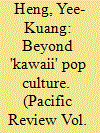

|
|
|
|
|
| Publication |
2014.
|
| Summary/Abstract |
Many studies of Japan's soft power are premised on the 'affective' dimensions of its kawaii pop culture that generate liking or interest. While entirely warranted, emphasising cultural attraction does not do sufficient justice to the multi-faceted foundations of Japanese soft power. Neither does it recognise other components of Joseph Nye's soft power framework stressing the 'normative' appeal of policies that reflect global norms. This article investigates the 'normative' dimensions of Japan's soft power on climate change, and whether it translates into international influence, as Nye predicted. The first section examines the Cabinet's 2010 New Growth Strategy, identifying a potential source of 'normative' soft power in its self-proclaimed desire to reinvent Japan as a 'trouble-shooting nation on global issues', specifically environmental challenges. Next, it analyses how Japanese entities (government, corporations, and NGOs) can transmit 'normative' soft power, and obstacles encountered. These transmission mechanisms include 'Cool Earth Partnership' programmes, the 'Future City Initiative' and the values-based Satoyama Initiative. The final section addresses conceptual implications that arise, and assesses whether Japan's 'normative' soft power has paid dividends. Drawing from literature on pioneer states and external reviews of Japan's alignment with key climate norms, the paper suggests that Japan's normative soft power is lacking in driving agendas at global climate forums. At a pragmatic problem-solving level, however, Japan is increasingly perceived as an attractive source of transferable solutions, reflecting climate norms such as developing eco-friendly technologies and providing assistance to help vulnerable countries mitigate climate change
|
|
|
|
|
|
|
|
|
|
|
|
|
|
|
|
| 3 |
ID:
123567
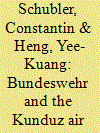

|
|
|
|
|
| Publication |
2013.
|
| Summary/Abstract |
The article sets out to investigate Germany's involvement in the controversial 2009 Kunduz air strike in Afghanistan. Utilizing a theoretical framework derived from existing literature on postheroic warfare, it employs a detailed case study of this particular military engagement to highlight the operational, strategic, and cultural dimensions of Germany's operations in Afghanistan. Through an analysis of primary documents and field interviews, this paper concludes that German public opinion, politicians, soldiers and media reacted in ways that mirror closely theories of postheroic warfare. These included widespread condemnation of the air strike, increasing doubts about the Afghan mission, and emphasis on low-risk stand-off precision weapons, which paradoxically resulted in higher civilian casualties. Germans still have a long way to go to accept the brutal realities of military engagements that the Bundeswehr increasingly confronts during its expanded scope of post-cold war military operations.
|
|
|
|
|
|
|
|
|
|
|
|
|
|
|
|
| 4 |
ID:
140418


|
|
|
|
|
| Summary/Abstract |
Existing debates suggest that small states can exert more influence than their size alone implies. This article contributes to such extant literature by addressing more specific questions about the conditions under which such ostensible price takers can play outsized roles. Generic claims of tiny Singapore punching above its weight have not yet been examined in light of its leaders' proactive initiatives in global governance to advance its national interests. Drawing on two strategies identified within theoretical debates on how small states project influence, this article analyzes Singaporean initiatives in coalition building and use of its comparative advantages in specific issue domains and how these strategies have evolved historically. Driven by an innate sense of vulnerability, Singapore's flexibility to embrace emerging modes of governance beyond its traditional UN-centric focus is a relatively overlooked feature in the literature deserving further attention.
|
|
|
|
|
|
|
|
|
|
|
|
|
|
|
|
| 5 |
ID:
160735
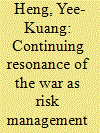

|
|
|
|
|
| Summary/Abstract |
In the late 1990s and 2000s, a slew of books and journal articles proposed that a nexus between risk management and warfare was emerging. This article argues that risk management ideas continue to shape recent campaigns against Libya, Islamic State, Syria, and the war on terror from Niger, Yemen to Somalia. It uses existing literature on risk and warfare to examine four key aspects of contemporary interventions. First, the article evaluates the overall strategic context as security concerns shift from terrorism toward renewed great power competition. Second, it re-assesses the risk calculus for military action through the language and grammar of risk invoked by politicians. Third and fourth, it addresses the continuing reliance on air power and the managerial ethos of military operations as important features of war as risk management.
|
|
|
|
|
|
|
|
|
|
|
|
|
|
|
|
| 6 |
ID:
098852
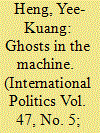

|
|
|
|
|
| Publication |
2010.
|
| Summary/Abstract |
Where ideas such as the 'End of History', 'Globalisation' or a 'New World Order' once animated the academy, recent debates within International Relations (IR) seem indicative of an emerging sea-change in intellectual trends. Scholars are now mooting instead a 'Return of History', the 'Return of Authoritarian Great Powers', the 'Return of Realism', the 'Resurgence of geopolitical competition' and even a 'Replay of the Great Game'. The resurrection of these so-called 'traditional' concepts raises an intriguing question: is the study of IR continually plagued by concepts that refuse to go away? This article begins by reviewing the intellectual historiography of IR, demonstrating that heralds of a 'new dawn' have repeatedly encountered the stubborn lingering presence of 'old' assumptions. The article then proceeds to analyse how the philosophical metaphor of a 'ghost in the machine' can help elucidate these peculiar intellectual quirks of IR, before concluding by contemplating the possibility of eventual 'exorcism'.
|
|
|
|
|
|
|
|
|
|
|
|
|
|
|
|
| 7 |
ID:
124485
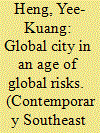

|
|
|
|
|
| Publication |
2013.
|
| Summary/Abstract |
Singapore's post-independence leaders perceived the country's vulnerability in terms of its miniscule size, lack of resources and hinterland, fragile ethnic harmony and geo-strategic location surrounded by larger, and potentially hostile, neighbours. Given such odds, Singapore sought to become a global city by tapping into international flows of goods and trade. Becoming a core node in the global economy also enhanced Singapore's strategic relevance, upping major powers' interest in its survival. However, due to its global connectivity Singapore's exposure to rapidly spreading global risks, such as pandemics and financial crises, has become increasingly noticeable. This paper seeks to uncover a paradox in Singapore's ambition to become a global city as new vulnerabilities emerge from its highly globalized status. Through a discourse analysis of policy-makers' statements and speeches, it reveals that a recurrent theme of perceived vulnerability today relates to the extensive global maritime, aviation and financial flows on which Singapore's continued prosperity depends. The paper concludes that the critical infrastructure that underpin its global connectivity - its airport, maritime port hub and financial centre - can also unwittingly circulate and import global risks such as pandemics, Weapons of Mass Destruction proliferation, financial contagion and terrorist financing, adding a new dimension to how its leaders perceive vulnerability.
|
|
|
|
|
|
|
|
|
|
|
|
|
|
|
|
| 8 |
ID:
188167


|
|
|
|
|
| Summary/Abstract |
Whereas Japan’s hedging vis-à-vis China in the Indo-Pacific has predominantly been the focus of academic analysis, hedging also explains Tokyo’s policy choices in the Gulf to a significant degree. Yet, existing literature has largely overlooked Japan’s hedging behaviour in the Gulf, which had to navigate the uncertainties generated by two competing powers, the United States and Iran. As hedging theory is above all concerned with risk, Japan’s policies demonstrate a concern with managing risks and the adverse consequences of misalignment or alignment. Tokyo’s attempts to serve as what former Foreign Minister Kono Taro called an “honest broker”, however, have not enabled it to shape the evolving regional security architecture. Japan’s propensity to deploy hedging more effectively in the Gulf may be shaped by domestic political considerations, pressing security challenges closer to home and personalities of key Japanese politicians such as late former Prime Minister Abe Shinzo.
|
|
|
|
|
|
|
|
|
|
|
|
|
|
|
|
| 9 |
ID:
094991
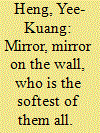

|
|
|
|
|
| Publication |
2010.
|
| Summary/Abstract |
As states jostle to attract and entice others by deploying a range of innovative strategies, a 'soft' power competition era looms possibly in the Asia-Pacific. This paper argues that reflecting on this period of competitive policy innovation provides a valuable opportunity to re-assess the theory and practice of Joseph Nye's 'soft' power, given its conceptual and empirical frailties: how theoretically precise are the policies commonly described as projecting 'soft' power? To do so, it undertakes a comparative evaluation of Japan's and China's 'soft' power strategies. By paying close attention to the theory-practice linkage, it illuminates the disparities in their understanding of Nye's 'soft' power. Rather than a one-size-fits-all concept, 'soft' power strategies with distinctively Japanese and Chinese characteristics are emerging, bringing different advantages and weaknesses. The proverbial magic mirror would conclude that by more closely matching Nye's formulations and displaying a less competitive streak, Japan appears the 'softer' power.
|
|
|
|
|
|
|
|
|
|
|
|
|
|
|
|
| 10 |
ID:
080315
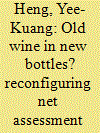

|
|
|
|
|
| Publication |
2007.
|
| Summary/Abstract |
Net assessment as a framework for security analysis last triggered vigorous discussion
in the closing stages of the Cold War. Nearly two decades later, this paper argues that
net assessment deserves to be revitalized and looked at again, as governments seek
analytical tools to understand the strategic environment in order to properly shape
their foreign and security policies. Drawing from Cold War academic debates on
net assessment, this paper first clarifies its definitions, origins and methods, highlighting
its strengths, failures and weaknesses. It then examines whether and how net
assessment might be modified and brought forward into the 21st century as an analytical
framework for two strategic problems: the War on Terror and the Iraqi insurgency.
The essay concludes that greater attention should be paid to net assessment, both
to address an urgent need for analytical tools to understand post-Cold War
exigencies, and as a remedy to the worst-case scenarios that have dominated
post-9/11 strategy.
|
|
|
|
|
|
|
|
|
|
|
|
|
|
|
|
| 11 |
ID:
179940
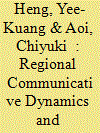

|
|
|
|
|
| Summary/Abstract |
Asian states are increasingly finding strategic communications to be an important tool of foreign and defense policy. Strategic communications involve coordinated messaging to achieve political objectives, utilizing words, actions, images, and various forms of signaling or symbols with the intention of influencing or persuading the target audiences. Such purposeful, coordinated, and targeted communications necessarily give rise to action-reaction dynamics that may have a tangible impact on interstate relations and the balance of power. How, then, do states in Asia employ such messaging activities in order to achieve influence? What dynamics are created by the employment of strategic communications by states in the region, and how do these affect intense greatpower rivalries and competition for leadership of international norms and in institutions in the region? The contributors to this special section address a series of common questions as the analytical framework for investigating how states conceptualize and utilize strategic communications to further national interests vis-à-vis their target states and domestic populace. The articles explore the communicative dynamics of strategic communications and how they impact perceptions of threat and the cost-benefit calculus associated with certain actions, such as escalation or de-escalation of tensions. This special section demonstrates the ways in which strategic communications are an integral element of an ongoing power transition in Asia and thus shape international relations in the region in critical ways.
|
|
|
|
|
|
|
|
|
|
|
|
|
|
|
|
| 12 |
ID:
079999
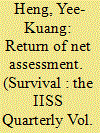

|
|
|
| 13 |
ID:
137256


|
|
|
|
|
| Summary/Abstract |
From Iraq to the Gulf of Aden and the South Pacific, this paper evaluates how far theoretical ideas about smart power manifest in operational missions of the Japan Self-Defense Forces (JSDF). To function within a ‘smart’ power context, this paper suggests that JSDF operates in ‘assisting’ mode, rather than the ‘threatening’ behavior of ‘hard’ power. JSDF also deployed alongside other Japanese ‘soft’ power tools – diplomatic, cultural, developmental, and NGOs, using tailored programs for different cultural and geographical contexts. Given constitutional constraints and public sensitivity towards coercive force, JSDF missions could be integrated more into a ‘whole-of-government’ approach advancing foreign policy goals through ‘smart power’.
|
|
|
|
|
|
|
|
|
|
|
|
|
|
|
|
| 14 |
ID:
068931
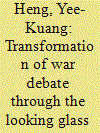

|
|
|
| 15 |
ID:
179965
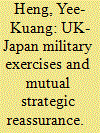

|
|
|
|
|
| Summary/Abstract |
The United Kingdom (UK) and Japan have conducted unprecedented military exercises as each other’s closest security partners in Asia and Europe, respectively. Despite publicly avowed closeness, these military exercises were not predicated on formal alliance commitments or deterrence of common adversaries underpinned by shared threat perceptions. Addressing this puzzle, a hitherto-overlooked perspective of mutual strategic reassurance for trusted partners is proposed here. This paper derives hypotheses from existing – but relatively under-developed – literatures on military exercises and reassurances that locate the drivers of reassurance in the needs and weaknesses of the other. What stems from this starting premise is an importance placed on high-level diplomacy and adjusting military deployments to allay each other’s strategic concerns. These hypotheses are tested by presenting original interview data supplemented with discourse analysis of both primary and secondary sources. The findings suggest that effusive diplomatic language vowing politico-strategic support for each other, reinforced by ground-breaking military exercises mutually reassured UK concerns about retaining post-Brexit global standing and Japan’s apprehension over its dire geo-strategic context. While not quite deterrence or alliance, these military exercises enabled the UK and Japan to transform their predominantly trade-based relationship into a more defence-oriented one.
|
|
|
|
|
|
|
|
|
|
|
|
|
|
|
|
| 16 |
ID:
067693
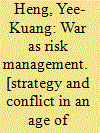

|
|
|
|
|
| Publication |
London, Routledge, 2006.
|
| Description |
viii, 214p.
|
| Standard Number |
0415375894
|
|
|
|
|
|
|
|
|
|
|
|
Copies: C:1/I:0,R:0,Q:0
Circulation
| Accession# | Call# | Current Location | Status | Policy | Location |
| 050659 | 355.0335/HEN 050659 | Main | On Shelf | General | |
|
|
|
|
|
|
|
|
|